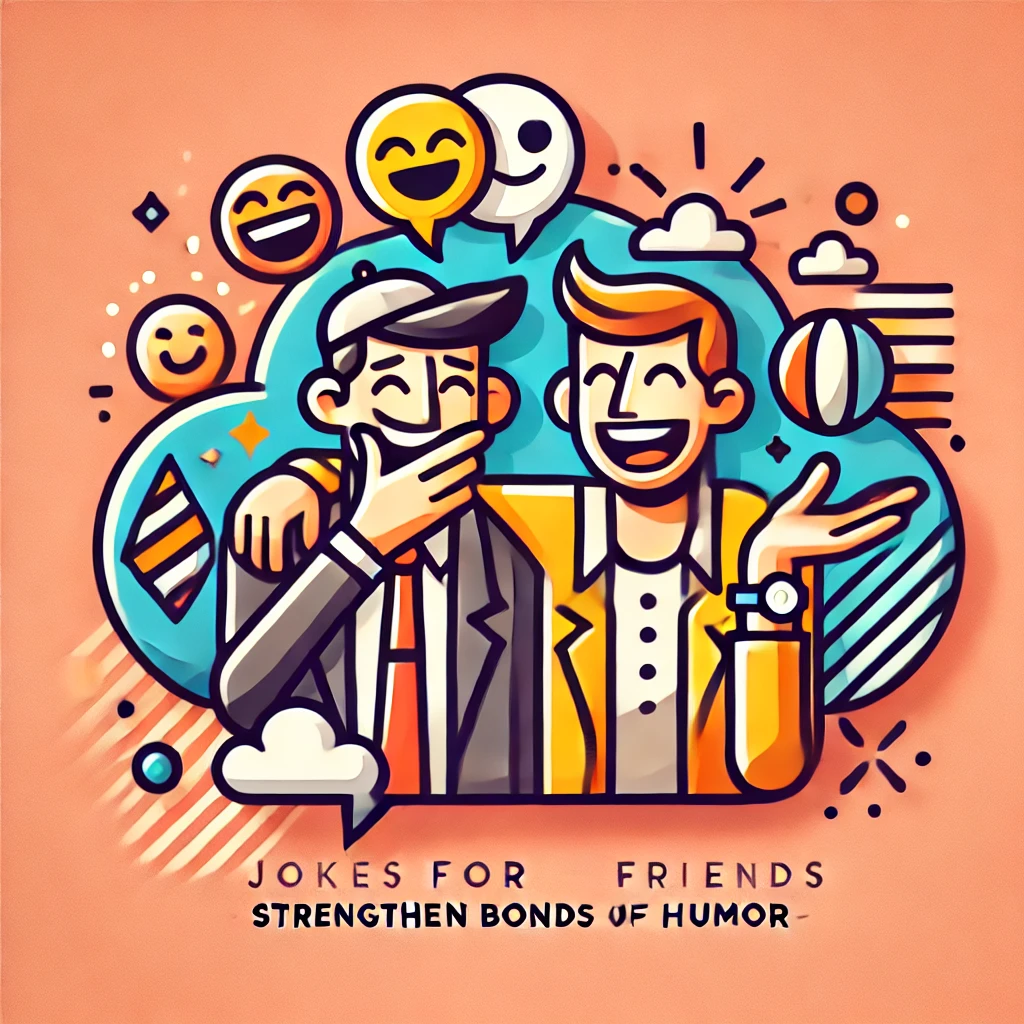Hey there, fellow joke enthusiasts and friendship aficionados! Have you ever wondered why your funniest friend is often your closest one? Or why sharing a laugh with your buddies feels so darn good? Well, buckle up, because we’re about to dive into the hilarious world of jokes and friendship. By the end of this blog, you’ll be armed with enough witty ammunition to make your friends laugh so hard they’ll forget about that time you “accidentally” ate their last slice of pizza. (We all know it wasn’t an accident, Steve.)
The Science of Laughter: Why Jokes Make Us BFFs
Let’s get a little nerdy for a moment, shall we? Don’t worry; I promise it’ll be more fun than your high school science class. (Unless your science teacher was secretly a stand-up comedian, in which case, lucky you!)
The Chemical Cocktail of Comedy
When we laugh, our brains release a delightful cocktail of chemicals that make us feel warm and fuzzy inside. We’re talking endorphins, dopamine, and serotonin – the holy trinity of feel-good neurotransmitters. It’s like your brain is throwing a party, and everyone’s invited! This chemical reaction not only makes us feel good but also helps to reduce stress and anxiety. So, the next time you crack a joke with your friends, remember that you’re basically a walking, talking, laughing pharmacy. (Side effects may include uncontrollable giggles and occasional snort-laughing. Consult your doctor if laughter persists for more than four hours.)
Shared Laughter, Shared Bonds
But wait, there’s more! (I’ve always wanted to say that.) When we laugh together, we’re not just enjoying a moment of humor; we’re creating a shared experience. This shared experience strengthens our social bonds and creates a sense of belonging. It’s like building a secret clubhouse, but instead of a treehouse, it’s made of inside jokes and memorable moments.
A study conducted in 2016 found that people who share a good laugh together are more likely to open up about personal information, leading to deeper, more meaningful relationships. So, the next time you’re trying to get to know someone better, skip the small talk and go straight for the funny bone!
The Art of Joke-Telling: From Awkward Silence to Roaring Laughter
Now that we know why jokes are so important for our friendships, let’s talk about how to deliver them without crickets chirping in the background. (Trust me, I’ve been there, and those crickets can be pretty judgmental.)
Know Your Audience
The first rule of Joke Club is… know your audience! (The second rule is… well, you know the rest.) Different friends have different senses of humor, so it’s essential to tailor your jokes accordingly. Here’s a handy table to help you navigate the treacherous waters of friend groups and their humor preferences:
| Friend Type | Humor Preference | Example Joke |
|---|---|---|
| The Intellectual | Witty wordplay and puns | Why don’t scientists trust atoms? Because they make up everything! |
| The Pop Culture Junkie | References to movies, TV shows, and memes | Why did Adele cross the road? To say hello from the other side! |
| The Absurdist | Nonsensical and surreal humor | Why did the scarecrow win an award? He was outstanding in his field! |
| The Dad Joke Enthusiast | Groan-worthy puns and one-liners | What do you call a fake noodle? An impasta! |
Remember, the key is to observe what makes your friends laugh and adapt your jokes accordingly. It’s like being a comedy chameleon, but hopefully with better delivery and fewer color-changing abilities.
Timing is Everything
Comedians often say that timing is everything, and they’re not wrong. (They’re also not right about everything – I mean, have you seen their fashion choices?) The perfect joke delivered at the wrong time can fall flatter than a pancake in a black hole. Here are some tips to help you nail your timing:
- Read the room: Make sure the mood is right for a joke. Funerals, for example, are generally not great times for stand-up routines. (Unless explicitly requested in the will, in which case, go for it!)
- Wait for a natural pause: Don’t interrupt a serious conversation with a sudden joke. It’s like throwing a pie in someone’s face while they’re trying to solve a Rubik’s cube – messy and confusing.
- Build anticipation: Sometimes, the lead-up to a joke can be just as funny as the punchline. It’s like foreplay, but for laughter. (And significantly less awkward to do in public.)
- Don’t oversell it: If you laugh at your own joke before you’ve even finished telling it, you’re basically serving a soufflé that’s already fallen. Let your friends do the laughing – that’s what they’re there for!
The Power of Inside Jokes: Creating Your Own Secret Language
Ah, inside jokes – the secret handshake of friendship, the verbal equivalent of matching friendship bracelets. These little nuggets of shared humor are like a love language for friends, only instead of saying “I love you,” you’re saying, “Remember that time we accidentally set the microwave on fire trying to make s’mores?” (Not that I’ve ever done that. Nope. Definitely not.)
The Birth of an Inside Joke
Inside jokes often arise from shared experiences, usually ones that are either hilariously embarrassing or so absurd that they become legendary within your friend group. They’re like lightning in a bottle – you can’t force them, but when they happen naturally, they’re pure magic.
Here’s a step-by-step guide to nurturing the growth of an inside joke:
- Experience something ridiculous together
- Laugh about it until your sides hurt
- Reference it at increasingly inappropriate times
- Watch as confusion spreads across the faces of uninitiated friends
- Feel smug about your secret club of two (or more)
- Rinse and repeat
Before you know it, you’ll have a whole dictionary of phrases and references that make absolutely no sense to anyone outside your circle. It’s like having your own secret language, only instead of saving the world, you’re using it to reminisce about that time Dave got his head stuck in a vending machine. (We’ve all been there, Dave. No judgment.)
Jokes as Social Lubricant: Breaking the Ice and Easing Tension
Let’s face it – sometimes, social situations can be more awkward than a giraffe on roller skates. That’s where jokes come in, acting as a sort of verbal WD-40 for sticky social situations. (Note: Please do not actually use WD-40 on people. It’s not as effective as jokes and significantly messier.)
Breaking the Ice
Whether you’re at a party where you only know the host or trying to integrate a new friend into your existing group, a well-timed joke can work wonders. It’s like a social defibrillator, shocking everyone into a more relaxed state. Just remember to keep it light and inclusive – you want to break the ice, not smash it into a million tiny, awkward pieces.
Here’s a table of ice-breaker jokes for different situations:
| Situation | Ice-Breaker Joke |
|---|---|
| Meeting new people | “I was going to tell a time-traveling joke, but you guys didn’t like it.” |
| First day at a new job | “I’m so excited to be here! I’ve already forgotten everyone’s name and spilled coffee on myself. It’s going great!” |
| Joining a new social group | “I promise I’m much cooler than this introduction would suggest. I’ve got at least three impressive skills, two of which are legal in most countries.” |
Easing Tension
Sometimes, friends argue. It’s a fact of life, like taxes or the inexplicable popularity of reality TV shows about people living in swamps. When tensions are high, a well-placed joke can be like a pressure release valve, letting out all the hot air and replacing it with laughter.
The key here is to make sure your joke doesn’t make light of the serious issue at hand. Instead, try to find common ground or point out the absurdity of the situation. For example, if your friends are arguing about politics, you could say something like, “Can we all at least agree that no matter who’s in charge, traffic will still be terrible and printers will never work when we need them to?”
The Do’s and Don’ts of Friendship Humor: Navigating the Minefield of Jokes
Alright, my fellow jesters, it’s time for a quick lesson in joke etiquette. Think of this as the “Mr. Miyagi” moment of our comedy journey, only instead of “wax on, wax off,” it’s “laugh on, laugh off.” (I’ll work on that.)
Do: Keep it Positive
Jokes that bring people together and make everyone feel good are the gold standard of friendship humor. They’re like a warm hug for the soul, only with more snort-laughing and less awkward physical contact.
Don’t: Punch Down
Avoid jokes that make fun of people or groups who are already marginalized or struggling. It’s not cool, and it’s definitely not funny. Remember, we’re trying to strengthen friendships here, not win a medal in the Jerk Olympics.
Do: Be Self-Deprecating (in Moderation)
Poking fun at yourself can be a great way to show humility and make others feel comfortable. It’s like offering up a sacrificial lamb to the comedy gods, only the lamb is your dignity, and the gods are your friends.
Don’t: Overdo the Self-Deprecation
Too much self-deprecating humor can make your friends worry about you and turn the mood from fun to therapy session real quick. Keep it light and balanced – you’re going for “charmingly humble,” not “someone please hug me.”
Do: Respect Boundaries
Pay attention to how your friends react to different types of jokes. If someone seems uncomfortable with a certain topic, respect that boundary. It’s like playing “The Floor is Lava,” but instead of lava, it’s topics that make your friends squirm.
Don’t: Use Humor to Avoid Serious Conversations
While jokes are great for easing tension, they shouldn’t be used to completely avoid important discussions. It’s like using a Band-Aid to fix a broken arm – it might cover up the problem temporarily, but it’s not solving anything.
Laughter is the Best Medicine (Except for Actual Medicine, Which is Probably More Effective)
As we wrap up this journey through the land of friendship and humor, remember that jokes are more than just a way to pass the time or avoid awkward silences. They’re a powerful tool for building and strengthening relationships, creating shared experiences, and making life a little bit more enjoyable.
So go forth, my funny friends, and spread laughter like it’s the world’s most enjoyable virus. Tell jokes, create inside jokes, and laugh together until your sides hurt and you can’t breathe. Just remember to keep it kind, keep it inclusive, and for the love of all that is holy, please don’t try to be a comedian while someone’s drinking – nobody wants to clean up that mess.
Now, if you’ll excuse me, I have to go practice my stand-up routine in front of my mirror. My reflection is a tough crowd, but I’m pretty sure I saw it crack a smile the other day. Or maybe that was just a smudge on the glass. Either way, I’m counting it as a win!
Disclaimer: This blog post is intended for entertainment purposes only. The author cannot be held responsible for any friendships lost due to terrible puns, dad jokes gone wrong, or the overuse of the phrase “Why did the chicken cross the road?” Data and studies mentioned are accurate to the best of our knowledge as of 2018. Please report any inaccuracies so we can correct them promptly, preferably in the form of a hilarious joke. Side effects of reading this blog may include uncontrollable laughter, an increased desire to tell jokes, and a sudden appreciation for bad puns. If symptoms persist, congratulations – you’re now the funny friend!




